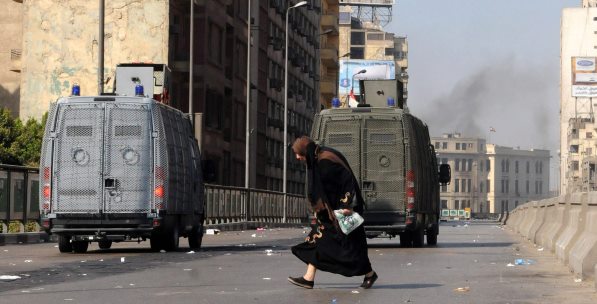Egypt is on the fast track to become a police state as it has begun turning the clock back to pre-2011 revolution since the July 3rd military coup d'état. All decisions and actions of the new junta point to this eventuality. To name only a few, 19 of the 25 newly appointed provincial governors are generals. A month long state of emergency was declared and acurfew was imposed in 14 provinces across the country. The army has been authorized to "assist" the police in maintaining "law" and "order". A crackdown on both foreign and independent Egyptian journalists was accompanied by the practices of intimidation and killings. Last, but not least, while the former dictator Hosni Mubarak was released from prison, the first democratically elected president of the country has been detained in an undisclosed location since the coup. Large numbers of Muslim Brotherhood leaders and members have been detained, arrested, and tortured on bogus charges.
This militarization of the Egyptian state has been accompanied by the terrorization of the large segment of its society through targeted and random massacres. August 14's massacrein Cairo represents the apex of the state's policy of brutal suppression of peaceful protestors who demand the reinstatement of democratically elected president Morsi. Snipers shooting at the protestors from rooftops, police setting fire to protestor camps while they are occupied, and security forces slaughtering people on the streets glaringly demonstrated the ugly and real face of the emerging junta in Cairo.
Incidences such as these and their different manifestations continue unabated. So far, the official statistics put the death toll over 600, but common sense suggests that the real number is probably several times higher. To put it differently, all the practices during more than the one and a half months of junta suggests that Egypt is sliding towards to become another 'republic of fear', to borrow the title of Kanan Makiya's seminal book, which gives a detailed account of Saddam Hussain's iron fist rule in Iraq.
In this atmosphere, the EU has a unique responsibility to dramatically reassess its relations with Egypt. The EU is Egypt's largest trade partner. It reserves five billion Euros for several forms of assistance and loans for Egypt. In 2004, the EU - Egypt signed Association Agreement within the framework of European Neighborhood Policy (ENP). The preambleof which emphasizes the centrality of compliance with human rights, democratic principles and economic freedom. Moreover, the motto of the ENP policy towards partner countries is "more for more", which means the more a partner country undertakes political and economic reforms, the more it can benefit from the EU's trade, aid and other form of assistance. Thus, the EU has a large reserve of cards to play vis-a-vis Egypt.
Thus far, the EU's reactions to the military coup and the ensuing massacres have been weakly- worded. Conclusion of EU Foreign Affairs Council Meeting on August 21 has largely refrained from taking concrete steps against military junta. Besides condemnation of violent crackdown of protestors by the security forces, the only practical step taken was the modest agreement by member states to suspend export licenses for military equipment that could be used for internal repression. It shied away from playing its cards to put pressure on the coup administration in Cairo to restore the democratic process back. The EU officials seem to think that taking such a course would diminish EU's influence over Egypt. Yet, the fact that the Egyptian authorities have undertaken a violent crackdown on protestors despite pleas from the EU against it and its rejection of an EU-US brokered peace deal, that was accepted by the Muslim Brotherhood, demonstrates that the EU's soft diplomacy and pleas are unheeded by the new military junta in Egypt.
In this context, sustaining normal relations with Egypt would not be only morally unacceptable, it also has the potential to generate significant costs to the EU, in te








